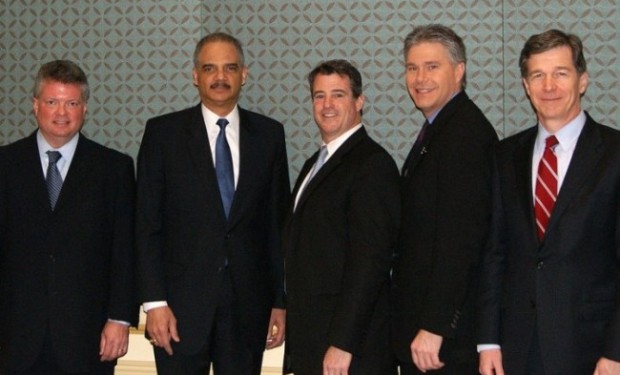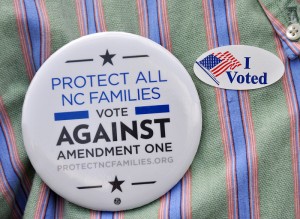Fighting the “Good Fight?”: When personal views and professional duties collide
North Carolina Attorney General Roy Cooper's challenge of defending a same-sex marriage ban that he personally opposes demonstrates the unique position faced by attorneys general.
 rom Left to Right--Mississippi AG Hood; US AG Holder; Maryland AG Gansler; Wisconsin AG Van Hollen, and NC AG Roy Cooper / Maryland AG Flickr
rom Left to Right--Mississippi AG Hood; US AG Holder; Maryland AG Gansler; Wisconsin AG Van Hollen, and NC AG Roy Cooper / Maryland AG Flickr
Last month, North Carolina Attorney General Roy Cooper publicly announced his support for same-sex marriage, which is not recognized in the state. The problem? Cooper is statutorily obligated to enforce the law to which he is personally opposed.
Now known simply as “Amendment One,” the contentious law began as Senate Bill 514. According to its text (pdf), the act’s purpose was “to amend the constitution to provide that marriage between one man and one woman is the only domestic legal union that shall be valid or recognized in this state.” The bill was passed by the North Carolina General Assembly on September 14, 2011, and was then put to ballot initiative.
Attorney General Cooper publicly opposed the initiative, calling it “unclear, unwise, and unnecessary.”
Notably, same-sex marriage was already not valid under North Carolina law prior to the bill’s introduction. In response to lawsuits and legislation in other states, opponents of same-sex marriage, such as the North Carolina Family Policy Council, pushed for an amendment to the state’s constitution because it would be more difficult to challenge and overturn than would a statute.
The proposed amendment spurred heated debate at both the state and national levels. Attorney General Cooper publicly opposed the initiative, calling it “unclear, unwise, and unnecessary.” Celebrities such as Jason Mraz, George Takei, and Neil Patrick Harris took to Twitter urging their North Carolina fans to “Vote Against,” the rallying cry of Amendment One opponents. The Reverend Billy Graham, a North Carolina native, placed full-page advertisements in fourteen of the state’s newspapers urging voters to “Vote For” the amendment. There was strong organizational support as well for both sides of the fight, with Vote for Marriage NC and the NC Values Coalition standing in support of Amendment One, and civil rights groups like the American Civil Liberties Union and Equality NC amongst its opponents.
After many months of tense debate and lobbying by both supporters and opponents, North Carolina voters approved Amendment One on May 8, 2012.
Several University of North Carolina School of Law professors published a report (pdf) warning of the initiative’s potential far-reaching negative effects. The authors noted that the proposed amendment would affect all unmarried couples in the state regardless of sexual orientation and argued fervently against its passage. Criticizing the amendment’s language as vague and overly broad, they cautioned that courts might construe it in a way that interferes with child custody rights, domestic violence protections, wills and other end-of-life arrangements, and health insurance benefits, among other things.
In response, three professors from Campbell Law School drafted a white paper rebutting many of the UNC School of Law professors’ claims. They argued that the amendment’s reference to “domestic legal unions” would be construed to apply only to same-sex marriages and would not affect unmarried heterosexual couples. They denied that the amendment would invalidate domestic violence protections for unmarried persons. They argued that child custody and visitation rights would be unaffected because they depend on the relationship between the parent and the child, not on marital status. Further, they contended that by using alternative criteria to define beneficiaries, employers could continue to provide health insurance to unmarried partners.
After many months of tense debate and lobbying by both supporters and opponents, North Carolina voters approved Amendment One on May 8, 2012. The amendment passed easily by a 61%-39% margin across the state, but it was defeated in large cities such as Charlotte and in areas that host prominent universities, like the Research Triangle.
Cooper’s support for same-sex marriage illustrates an interesting and unique task faced by attorneys general across the nation: the charge of enforcing and defending state laws to which they are personally opposed.
Post-ratification, Article XIV, Sec. 6 of the North Carolina Constitution reads, “Marriage between one man and one woman is the only domestic legal union that shall be valid or recognized in this State. This section does not prohibit a private party from entering into contracts with another private party; nor does this section prohibit courts from adjudicating the rights of private parties pursuant to such contracts.”
Attorney General Cooper had not addressed the substantive issue of same-sex marriage when he previously weighed in on Amendment One; he had instead focused on the amendment’s broad and unclear language. His more recent announcement, however, has some conservative politicians and organizations worried that he will not zealously defend the law. While Cooper’s support for same-sex marriage comes as little surprise given his public stance prior to the amendment’s passage, it does illustrate an interesting and unique task faced by attorneys general across the nation: the charge of enforcing and defending state laws to which they are personally opposed.
The Attorney General of North Carolina is “the state’s top law enforcement officer and top lawyer.” Elected every four years by the people of North Carolina, the Attorney General represents the state’s interests in court. The office is charged with providing legal representation to the state government and may also take action to assert the rights of North Carolina’s citizens in public interest cases. Cooper has held the office since 2000 and was reelected to his fourth term in 2012.
Attorney General Cooper has said that his personal views on same-sex marriage will not affect his ability to “vigorously defend” Amendment One in court. So far, it seems as though he has held true to this promise. Days after Cooper publicized his support for marriage equality, Buncombe County Register of Deeds Drew Reisinger accepted ten marriage license requests from same-sex couples. Cooper’s office swiftly communicated to Reseinger, per Reseinger’s request, that his actions would be ill-advised (pdf) because issuing marriage licenses to gay couples would be illegal under current North Carolina law.
An important part of the job is knowing “the difference between policy and arguing the constitutionality of the law.”
Cooper has also publicly stated that he disagrees with North Carolina’s new voter ID law. The law, which is ostensibly aimed at reducing voter fraud, limits early voting and requires voters to produce government-issued photo identification prior to voting. However, Cooper has declined to comment on its legality because of his duty to defend the law in court, noting that an important part of his job is knowing “the difference between policy and arguing the constitutionality of the law.” Importantly, the United States Department of Justice sued the state over four provisions of the voting law in September, calling it “discriminatory in intent and effect.” Cooper will not argue the case in federal court.
Fairly assessed, it seems as though Cooper’s personal beliefs have not yet interfered with the execution of his official duties. However, there have been hints that he may be considering a run for governor in 2016. Consequently, there are those who decry his public support for same-sex marriage as an inappropriate and ill-timed political move. The North Carolina Family Policy Council opposed Cooper’s appearance at a November 9, 2013, Equality NC gay-rights gala because of his current position as lead defendant in an ACLU-supported lawsuit challenging the marriage amendment. Cooper was the keynote speaker at the event.
When the client is the state of North Carolina, the stakes are much higher for a lawyer.
A lawyer’s role is to serve as a zealous advocate for his or her clients. As such, lawyers may be, and often are, required to argue positions that they do not personally support or defend clients with whom they disagree. It can be a difficult task, but it is one with which lawyers are all too familiar. Cooper’s recent public announcements, however, illustrate the unique position faced by attorneys general. When the client in question is the state of North Carolina, with millions of citizens possibly affected by a single day in court, the stakes are much higher.






